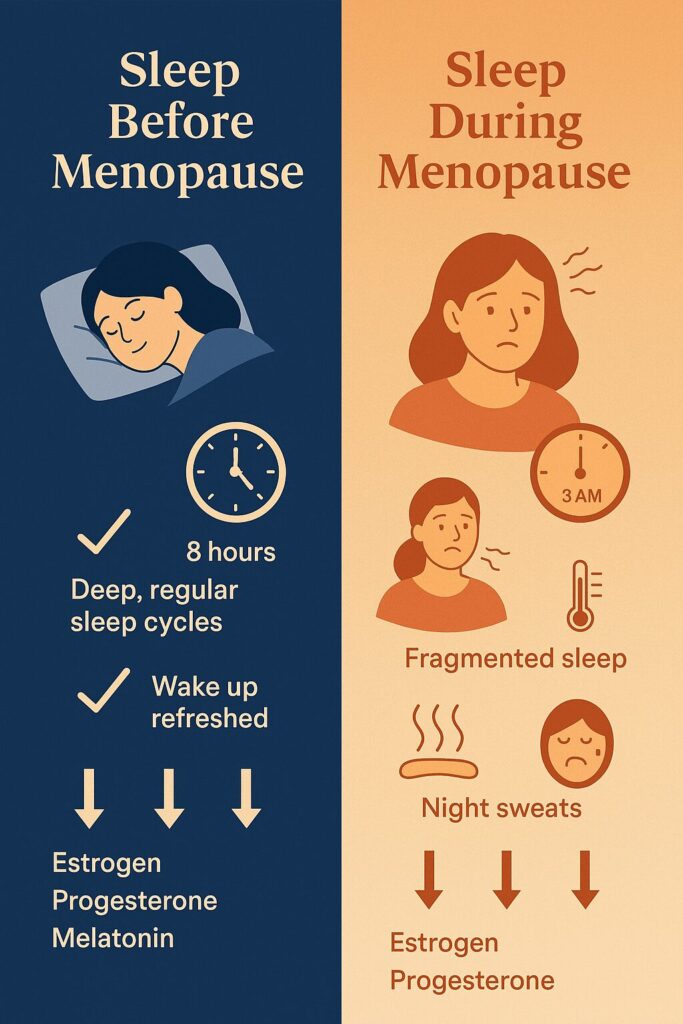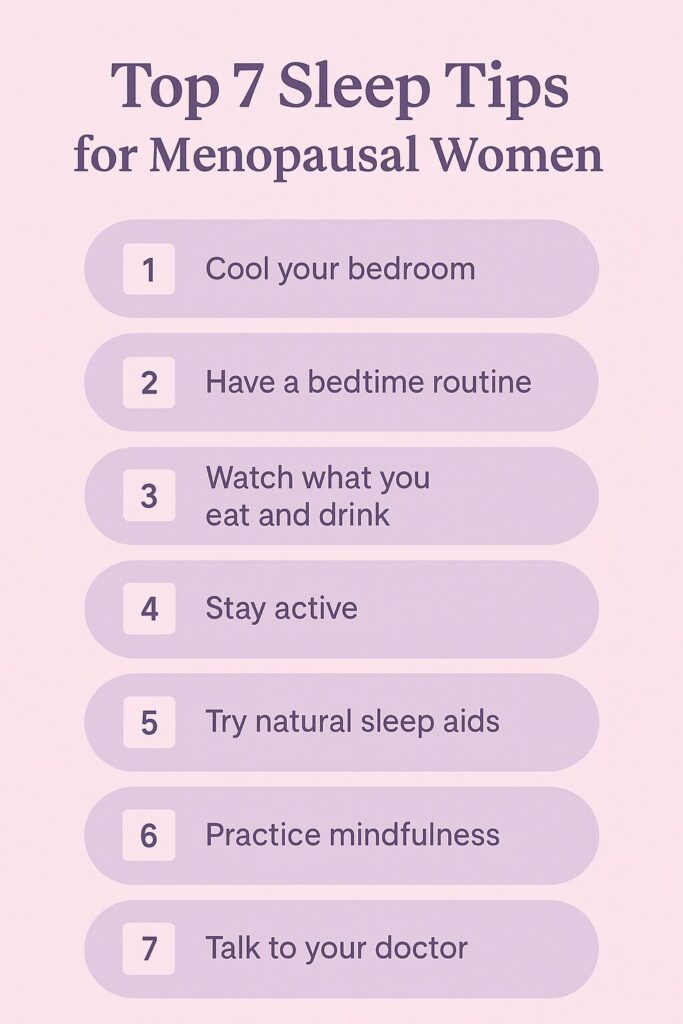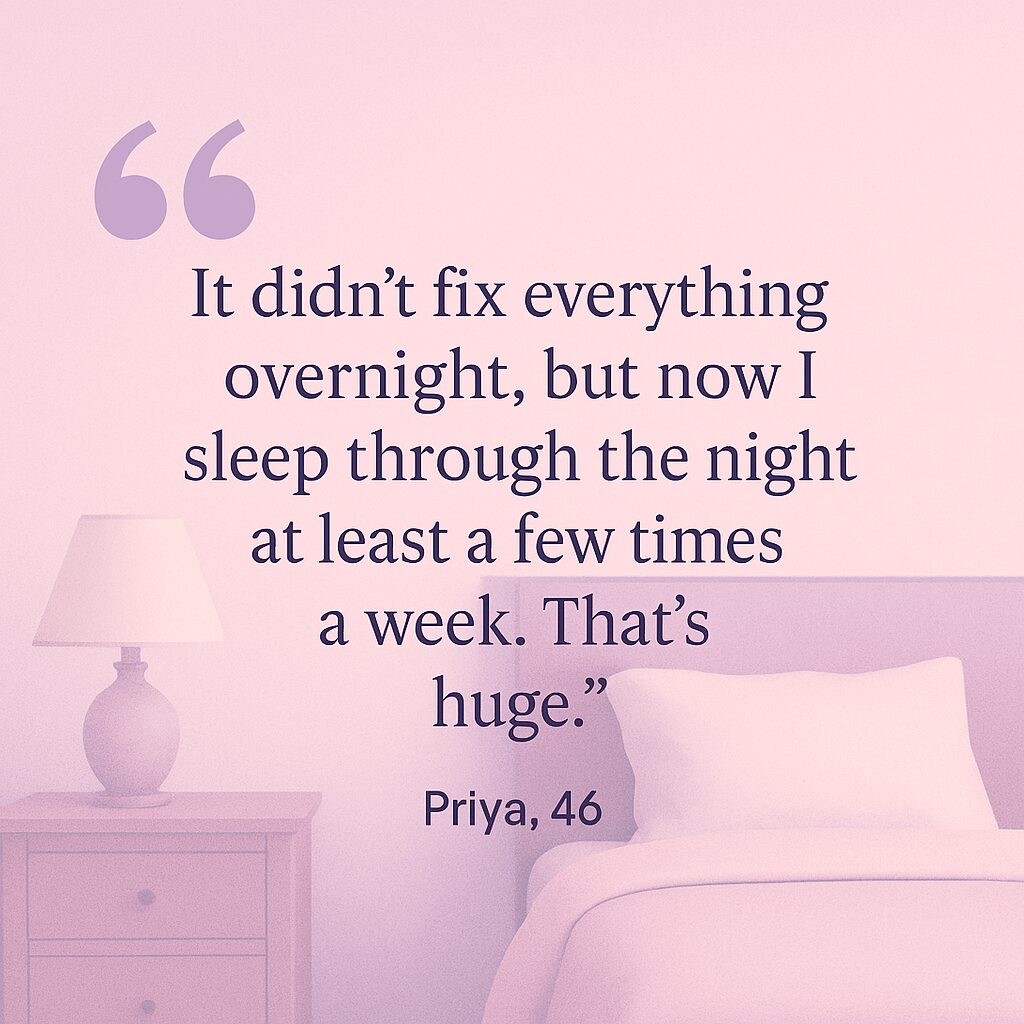If you’re a woman in your 40s or 50s and finding it harder than ever to get a good night’s sleep, you’re definitely not alone. One of the most common and frustrating symptoms women experience during menopause (and even the years leading up to it) is insomnia.
But why does menopause mess with our sleep so much—and what can we do about it? Let’s break it down in a simple, no-nonsense way.
“I used to sleep like a rock, but once I hit my 40s, it was like someone flipped a switch.” — Real talk from women everywhere.
What Is Insomnia?
Insomnia isn’t just about tossing and turning. It can show up in a variety of ways that go beyond just struggling to fall asleep:
- Trouble falling asleep, even when you’re exhausted
- Waking up during the night and having a hard time drifting back to sleep
- Waking up too early and feeling like you’ve barely slept
- Feeling fatigued or having low energy during the day—even after logging what should be a full night’s sleep
If it’s messing with your mood, focus, or energy levels, it’s more than a nuisance. It’s a sign that your sleep health needs some attention.
“Sleep isn’t a luxury—it’s a basic need. And when you’re not getting it, everything else suffers.”
The Menopause–Insomnia Connection
During menopause, your hormone levels take a significant dip, and that shift can wreak havoc on your ability to sleep soundly:
- Estrogen helps regulate your body temperature and supports a stable sleep cycle. When it drops, hot flashes and night sweats can disrupt your rest.
- Progesterone has a natural calming effect. As it declines, falling and staying asleep becomes more difficult.
- Melatonin, your natural sleep hormone, also decreases with age, making it harder to get that deep, restorative rest.
It’s a triple whammy that many women don’t see coming.

Perimenopause vs. Menopause: When Sleep Problems Begin
Many women start struggling with sleep during perimenopause, the transitional phase before menopause. Your period might still show up (though irregularly), but behind the scenes, your hormones are already shifting.
Sleep disruptions during perimenopause can sneak up on you in your late 30s or early 40s. Night sweats, mood swings, and anxiety often come along for the ride—turning bedtime into a battle.
“I thought I was just stressed, but once I understood what was really happening, I felt less alone—and more in control.”
You’re Not Just “Getting Older”—It’s a Real Thing
Let’s bust the myth: poor sleep isn’t just part of “getting older.”
In fact, over 60% of women going through menopause report sleep problems. It’s not in your head. These are real hormonal changes, and they affect how your brain and body function at night.
Understanding that your sleep struggles are part of a natural (but challenging) phase can bring a sense of relief and empower you to do something about it.
Tips to Sleep Better During Menopause

The good news? You can improve your sleep. It often starts with small, intentional changes:
1. Cool Your Sleep Environment
- Keep your bedroom cool, well-ventilated, and dark.
- Use breathable sheets, moisture-wicking pyjamas, and a fan or cooling pillow.
2. Create a Calming Night Routine
- Go to bed and wake up at the same time daily.
- Try light reading, warm baths, or soft music.
- Avoid screens for 30–60 minutes before sleep—blue light messes with melatonin.
3. Rethink Your Evening Diet
- Avoid caffeine after 2 PM.
- Limit alcohol—though it might make you drowsy, it disrupts sleep later.
- Skip heavy meals close to bedtime.
4. Move Your Body (But Not Too Late)
- Daily exercise helps regulate sleep cycles.
- Try morning or early evening walks, gentle yoga, or stretching.
5. Natural Helpers
- Herbal teas like chamomile, lemon balm, or valerian can calm the mind.
- Supplements like magnesium or melatonin may help (talk to your doctor first).
6. Manage Stress with Mindfulness
- Meditation, deep breathing, and journaling work wonders.
- Apps like Calm, Insight Timer, or Headspace offer helpful guided sessions.
7. Know When to Ask for Help
- Talk to your doctor about menopause and treatments including, HRT (Hormone Replacement Therapy), CBT-I (Cognitive Behavioral Therapy for Insomnia), or other personalized treatments.
Also Read:
- Six Simple At-Home Remedies To Improve Sleep And Fight Insomnia
- Menopause and Memory Loss: What’s Normal, What’s Not & How to Feel Sharp Again
A Gentle Reminder (with a Real-Life Example)
You’re doing your best, and that’s more than enough.

Take Priya, 46, for example. She started waking up at 3:00 AM every night, drenched in sweat and wide awake. At first, she blamed stress, then her diet. But when nothing helped, she realised her insomnia symptoms aligned with menopause.
Priya began making small, consistent changes—cooler bedding, calming nighttime routines, and switching her nightly wine for chamomile tea.
“It didn’t fix everything overnight,” she says, “but now I sleep through the night at least a few times a week. That’s huge.”
Every step counts. And simply knowing why this is happening can be a game-changer.
Final Thoughts
Menopause is a big transition, and yes—it can seriously mess with your sleep. But that doesn’t mean you’re powerless.
With a few smart habits, some self-compassion, and maybe a chat with your doctor, you can find your way back to peaceful nights.
Try tracking your sleep for a week. Note when you go to bed, how you feel the next morning, and anything that seemed to help or hurt. You might spot patterns—and small shifts that make a big difference.
You deserve rest. You deserve clarity. You deserve support in this powerful phase of life.
💤 Track Your Sleep, Find Your Patterns
Struggling with sleep during menopause? Start by tracking it! This “Restful Nights Ahead” Sleep Tracker helps you spot patterns, understand triggers, and take back control of your rest.
📥 Download the Sleep Tracker here
Use it daily for a week—note your bedtime, wake-ups, how rested you feel, and anything else that might affect your sleep.
Awareness is the first step to better sleep. You’ve got this!
Images: canva.com
